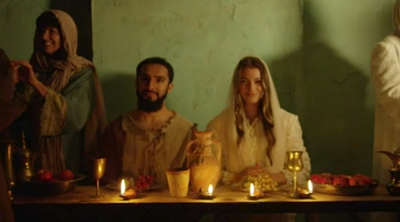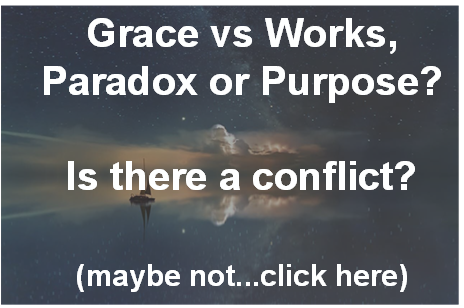Recently I purchased and watched with my son a streaming version of the video Before the Wrath. Let me start by saying I didn't really know anything about the video other than it was recommended by several of the sites I follow. I honestly thought it was a movie from a Christian studio. There are scenes that are acted out, but they are only there to help the viewer visualize the topic of the video. In reality, Before the Wrath is a video Bible Study. It's not a documentary, although it references many ancient resources. Instead, it is a fascinating, forward-looking comparison of the traditional Galilean wedding ceremony with the wedding of the Bride of Christ and the Marriage Supper of the Lamb.
It wasn't an entertainment movie, it was something far more important. Instead, it was an eye-opening, deep dive into a cultural aspect of Galilean life during biblical times that I didn't know anything about. The video includes expert insights from Jack Hibbs, Amir Tsarfati, Jan Markell, JD Farag, and a few more.
Since I found the video so fascinating and important I wanted to write something about the topic and post it on my website. Consider this article my "book report.". While this article is shorter than an 80-minute video and I'm summarizing key points, there's a lot to cover. So grab your cup of coffee and let's dig in. What we are discussing here is central to the purpose of the church at End Times, our understanding of the Rapture, and how the church relates to Jesus in eternity. But first, let me give credit where credit is due. Everything I learned here I learned from watching the video multiple times and I claim no original knowledge here. If you want to know what Heaven is like, or if you want to know why it is important to know about Heaven today, I can help with the articles referenced here at these links. But if you want to know where I got my information for this article, all credit goes to the maker of the video and the theologians contained within. I highly recommend it. If you like what you read here, you will really appreciate the video.
The Church is the Bride of Christ
Why do we consider the church to be the Bride of Christ? Because that's what the Bible says. Consider these two scriptural references, the first from Ephesians 5:
22 Wives, submit to your own husbands, as to the Lord. 23 For the husband is the head of the wife even as Christ is the head of the church, his body, and is himself its Savior. 24 Now as the church submits to Christ, so also wives should submit in everything to their husbands.
25 Husbands, love your wives, as Christ loved the church and gave himself up for her, 26 that he might sanctify her, having cleansed her by the washing of water with the word, 27 so that he might present the church to himself in splendor, without spot or wrinkle or any such thing, that she might be holy and without blemish. 28 In the same way, husbands should love their wives as their own bodies. He who loves his wife loves himself. 29 For no one ever hated his own flesh, but nourishes and cherishes it, just as Christ does the church, 30 because we are members of his body. 31 "Therefore a man shall leave his father and mother and hold fast to his wife, and the two shall become one flesh." 32 This mystery is profound, and I am saying that it refers to Christ and the church. 33 However, let each one of you love his wife as himself, and let the wife see that she respects her husband. Ephesians 5:22-33 ESV (emphasis added)
and the second from Revelation 19.
7 "Let us rejoice and exult
and give him the glory,
for the marriage of the Lamb has come,
and his Bride has made herself ready;
8 it was granted her to clothe herself
with fine linen, bright and pure"—
for the fine linen is the righteous deeds of the saints.9 And the angel said to me, "Write this: Blessed are those who are invited to the marriage supper of the Lamb." And he said to me, "These are the true words of God." Revelation 19:7-9 ESV (emphasis added)
To have a wedding it is necessary to have a bride and a groom. To have a marriage supper means the marriage is beginning or it has begun. Therefore, it is clear from these two passages that the church is to be united together with Christ after the Rapture. Exactly what that uniting entails in Heaven is unknown to me. However, getting from here to there is crystal clear. At the end of the Church Age, the church will be Raptured to Heaven. How do we know? We know because Jesus told us. After watching the video Before the Wrath you will definitely understand more about the Bride of Christ and the Marriage Supper of the Lamb, perhaps significantly more than you ever have before.
Interpreting the Bible from the Galilean Perspective
Anyone who has studied the New Testament knows Jesus frequently used parables to communicate his messages. That's not surprising. people learn best by relating something new to something they already know, and when asked these days what type of learner a person is, the vast majority will answer that they are a "visual learner". Essentially, Jesus used parables to create word picture illustrations on the topics he was teaching about to visual learners in the first century. Although sometimes, even the Disciples questioned why Jesus spoke in parables so frequently.
10 Then the disciples came and said to him, "Why do you speak to them in parables?" 11 And he answered them, "To you it has been given to know the secrets of the kingdom of heaven, but to them it has not been given. 12 For to the one who has, more will be given, and he will have an abundance, but from the one who has not, even what he has will be taken away. 13 This is why I speak to them in parables, because seeing they do not see, and hearing they do not hear, nor do they understand." Matthew 13:10-13
Seven different times in Matthew 13 Jesus the statement (or something similar) that "the kingdom of heaven is like..." Since no all-encompassing, 100% complete, Earthly description of the Kingdom of Heaven is possible, Jesus used numerous small stories to paint individually incomplete but collectively more vivid word pictures to explain it. Everything Jesus said built on people's understanding of Old Testament scripture and personal experience.
How about we take this one step further. As the video reminded me, all twelve disciples were Galileans. They were Galileans from birth to the best of our knowledge and they lived their whole lives in Galilee before Jesus called them. Not only that but more than 60% of the events recorded in the Gospels occurred in Galilee. That's what makes understanding Galilean culture critical to interpreting the New Testament. Think about it, if Jesus had been born in your community and He wanted to teach His truths to your community, wouldn't He want to communicate in a way that made the most sense to the people in your community? Therefore, when we read the New Testament we need to include all of our available tools for interpretation. For critical or confusing scripture we need to:
- Evaluate the scripture in light of any Old Testament references
- Identify the original meaning of the original Greek behind keywords within the passage
- Consider the meaning within the context of Hebrew tradition and Jewish culture
- Consider the meaning within the context of Galilean culture
It is only within the added context of the Galilean culture can we best understand the meaning of the Last Supper, our current time of preparation on Earth, the Bride of Christ, the Rapture, and the Marriage Supper of the Lamb. Let's take a look.
Galilean Wedding Betrothal
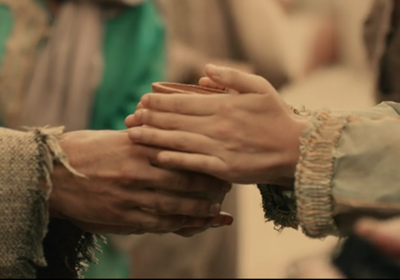 What captivated me while watching the video was the facts and context I knew nothing about. For example, in 1st century Galilee weddings were the most important events that occurred in any town. In hindsight, this is not surprising but it was a revelation to me. In biblical times the lineage and perpetuation of the family were extremely important. Your lineage was the key component of any inherent honor ascribed to your family, your potential for opportunities in life, and the foundation of your personal legacy. But your lineage and perpetuation of the family were also critical for the survival of the family, and in an agrarian society survival was your full-time job. Survival required working from sun up to sun down every day to complete all of the tasks required to feed the family. If you didn't, the likely alternative was starvation. One thing that has been consistent from then to now is that it is easier to care for a larger family than it is a smaller family in an agrarian society. Even today farmer families are typically much larger than those who live in the city.
What captivated me while watching the video was the facts and context I knew nothing about. For example, in 1st century Galilee weddings were the most important events that occurred in any town. In hindsight, this is not surprising but it was a revelation to me. In biblical times the lineage and perpetuation of the family were extremely important. Your lineage was the key component of any inherent honor ascribed to your family, your potential for opportunities in life, and the foundation of your personal legacy. But your lineage and perpetuation of the family were also critical for the survival of the family, and in an agrarian society survival was your full-time job. Survival required working from sun up to sun down every day to complete all of the tasks required to feed the family. If you didn't, the likely alternative was starvation. One thing that has been consistent from then to now is that it is easier to care for a larger family than it is a smaller family in an agrarian society. Even today farmer families are typically much larger than those who live in the city.
Back to the topic of discussion, which is a betrothal. In modern-day terms, we would think of the betrothal as an engagement, but the video indicates the two are not exactly the same. Today we consider a betrothed couple to be engaged. In Galilean times the betrothed couple would essentially be married, but their life together had not yet begun. There was no later ceremony to officially commit the couple into marriage. There was only a wedding feast after the preparation, but we'll discuss that in a moment.
The betrothal process in Galilee required the families of both the bride and the groom to meet at the city gates. In biblical times city gates were the central location for activities such as announcements, court, and important business activities. There were always people milling about the city gates. As a result, that's where the betrothal took place since witnesses were required to establish a covenant. The betrothal process included several important steps, but it began when the father of the groom would read out loud at the city gates and in the presence of both families a written proposal for the marriage. Should the father of the bride find the agreement acceptable, he would accept the proposal on behalf of his family. Afterward, the groom's father would give the bride's father a dowry. In modern-day terms, the dowry essentially represents insurance paid by the groom's family to the bride's family. The dowry would be used by the bride's family to pay living expenses for their daughter should the marriage fail for some reason and she returns to live with her family.
However, acceptance of the proposal by the bride's father and the paying of the dowry by the groom's father doesn't guarantee the betrothal will be completed. There is one more key moment when the betrothal could be halted before it is complete. The next step in the process requires the groom to pour a cup of wine and give it to his bride. The groom reverently gives the cup of wine to his bride with both hands and the bride accepts it in the same way. In the betrothal, this cup is referred to as "the cup of joy" for good reason. For the bride, drinking from the cup would likely lead to a life of joy and motherhood. Whereas declining the cup could potentially lead to a life of childlessness, loneliness, and despair. In your life and mine, choosing whether or not to drink from the cup is the single most important choice we will make in our lives. Drinking from the cup brings eternal joy, whereas declining the cup leads to eternal sorrow and damnation.
The moment in time when the bride is holding the cup of wine is the most important time of the wedding and it is one of the most important times in the bride's life. At this point, the bride has complete control over the betrothment process. In order for the betrothal to be complete, the bride must drink from the cup of wine given to her by the groom. If she drinks from the cup the betrothal will proceed. If she declines there will be no wedding. This aspect of the marriage process is unique to the Galilean culture in biblical times. No other Middle Eastern cultures, not even the Jewish culture in Jerusalem gave the bride the absolute and final choice to access or reject the covenant, but in Galilee, this was the process. Assuming the bride accepted the betrothal by drinking the wine from the cup, the groom would drink from the same cup to seal the new covenant between them.
With the covenant sealed the groom would publically pronounce these words to the surrounding witnesses:
You re now consecrated to me by the laws of Moses and I will not drink of the cup again until I drink it anew with you in my father's house.
After the groom says these words the betrothal is now complete. Both families will drink the wine and break the bread to celebrate. Then both families will go to their respective homes, including the bride and the groom. The groom will go to his father's home and the bride will go to her father's home. While they are betrothed and their marriage is official, their married life has not yet begun.
Compare that to what Jesus said at the Last Supper in Matthew 26. Sounds familiar?
26 Now as they were eating, Jesus took bread, and after blessing it broke it and gave it to the disciples, and said, "Take, eat; this is my body." 27 And he took a cup, and when he had given thanks he gave it to them, saying, "Drink of it, all of you, 28 for this is my blood of the covenant, which is poured out for many for the forgiveness of sins. 29 I tell you I will not drink again of this fruit of the vine until that day when I drink it new with you in my Father's kingdom." Matthew 26:26-29 ESV
Galilean Wedding Preparation
The conclusion of the betrothal process is the beginning of the next step, the preparation. Perhaps you might ask, "Preparation for what?" The answer is preparation for the wedding feast or celebration. Just like modern weddings, the preparation phase took a long time to complete; typically around one year. The difference is, in modern days is the wedding includes a ceremony and a reception whereas in biblical times in Galilee it was a wedding feast or reception only.
Not only was there planning for the feast itself, but just as important the bride and groom were getting prepared to live together as a married couple. For the groom, preparation required building a room for him and his wife to live. Typically the groom would personally build the new room and it would be an extension to his father's house. Building the room could take several months. Then once the room was finished, the groom was responsible for finding and acquiring all of the furnishes that they would need to live in the room. What do you think about how the groom's preparations align with Jesus' words in John 14?
14 "Let not your hearts be troubled. Believe in God; believe also in me. 2 In my Father's house are many rooms. If it were not so, would I have told you that I go to prepare a place for you? 3 And if I go and prepare a place for you, I will come again and will take you to myself, that where I am you may be also." John 14:1-3 ESV
Just as the Galilean groom went away after the betrothment to prepare a place to live and he promised to return to retrieve her when everything was ready, so Jesus went away to prepare a place for his bride (the Church) to live and He promises to come back and get us, What is profoundly important about this is that with His promise to return to retrieve his bride, Jesus just introduced the concept of the Rapture. The theology of the Rapture is not something constructed from thin air in the 1800s or even back in the 300s. Jesus made the commitment Himself at the Last Supper as understood from within the context of a Galilean wedding. But wait, it gets even better!
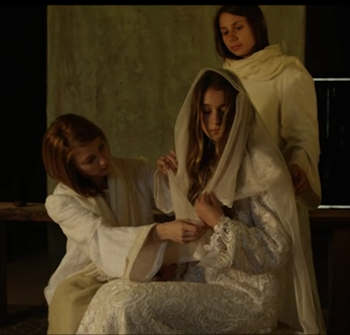 Meanwhile, the bride was busy with her own preparations. She was preparing to be retrieved by the groom and taken to their wedding feast and her new life. One of the most important aspects of the bride's preparation was her wedding dress. The Galilean wedding dress could take months to create. Many of the materials needed to create the dress were not available locally. Therefore the bride's family would need to either travel to a remote location to acquire them or wait until a traveling merchant brought them to their town.
Meanwhile, the bride was busy with her own preparations. She was preparing to be retrieved by the groom and taken to their wedding feast and her new life. One of the most important aspects of the bride's preparation was her wedding dress. The Galilean wedding dress could take months to create. Many of the materials needed to create the dress were not available locally. Therefore the bride's family would need to either travel to a remote location to acquire them or wait until a traveling merchant brought them to their town.
A critical element to the bride and the groom's preparation was the fact that in the Galilean wedding tradition, nobody except the groom's father knew when the wedding feast would occur. The date and the hour were unknown to anyone except the father, although there were two known characteristics of the date and the hour. First, the feast would not occur until after all of the preparations had been finished and inspected by the groom's father. Second, the feast would begin at an hour sometime during the middle of the night.
After finishing her dress, the bride and her bridesmaids prepared the other items they needed to take with her to the wedding feast. One of the most important items would have been extra oil for their lamps since the call to begin the feast would go out in the middle of the night. Remember the story of the ten virgins in Matthew 25?
25 "Then the kingdom of heaven will be like ten virgins who took their lamps and went to meet the bridegroom. 2 Five of them were foolish, and five were wise. 3 For when the foolish took their lamps, they took no oil with them, 4 but the wise took flasks of oil with their lamps. 5 As the bridegroom was delayed, they all became drowsy and slept. 6 But at midnight there was a cry, ‘Here is the bridegroom! Come out to meet him.’ 7 Then all those virgins rose and trimmed their lamps. 8 And the foolish said to the wise, ‘Give us some of your oil, for our lamps are going out.’ 9 But the wise answered, saying, ‘Since there will not be enough for us and for you, go rather to the dealers and buy for yourselves.’ 10 And while they were going to buy, the bridegroom came, and those who were ready went in with him to the marriage feast, and the door was shut. 11 Afterward, the other virgins came also, saying, ‘Lord, Lord, open to us.’ 12 But he answered, ‘Truly, I say to you, I do not know you.’ 13 Watch therefore, for you know neither the day nor the hour." Matthew 25:1-13
Finally, when everything was prepared and the day of the wedding feast appeared to draw near the bride and her bridesmaids would begin dressing in their wedding clothes every night before they went to bed. The bride and her bridesmaids would sleep in their wedding clothes every night so that they would be prepared to quickly get up and leave when they heard the call for the feast to begin. Around them, they would have laid out everything they needed to take with them when they left. They did not know the day or the hour, but they prepared every day and every night until the appointed time.
What do you think about the fact that according to Galilean tradition, only the groom's father knew the day and the hour when the wedding feast would begin perfectly parallels what Jesus said in the Olivet Discourse in Matthew 24?
36 "But concerning that day and hour no one knows, not even the angels of heaven, nor the Son, but the Father only. 37 For as were the days of Noah, so will be the coming of the Son of Man." Matthew 24:36-37
Galilean Wedding Feast
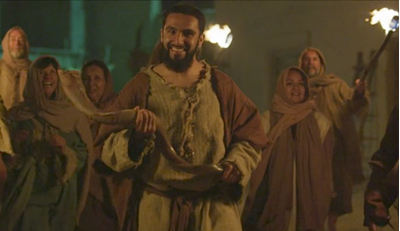 On that day when everything was ready, the father would start the feast by waking his son in the middle of the night and saying "Go get your bride." The now awake son grabs a shofar, and he goes out into the town to announce to everyone that the time has come!
On that day when everything was ready, the father would start the feast by waking his son in the middle of the night and saying "Go get your bride." The now awake son grabs a shofar, and he goes out into the town to announce to everyone that the time has come!
A shofar is a ram's horn and it sounds like a trumpet when blown. The repeated shofar blasts wake the bride, bridesmaids, and her guests, and they quickly get ready to meet the groom. The groom, his family, and his guests process to the bride's house to bring them to the wedding feast. Sounds similar to this scripture from 1 Thessalonians?
16 For the Lord, himself will descend from heaven with a cry of command, with the voice of an archangel, and with the sound of the trumpet of God. And the dead in Christ will rise first. 1 Thessalonians 4:16 (emphasis added)
When the procession arrives at the bride's house, the bride and everyone attending the feast join the procession as they return to the father of the groom's house. However, the bride does not walk to the feast. In Galilee, the bride is carried to the wedding feast in a litter. The tradition of carrying the bride is referred to as "flying the bride home." How does that compare to the Rapture?
17 Then we who are alive, who are left, will be caught up together with them in the clouds to meet the Lord in the air, and so we will always be with the Lord. 1 Thessalonians 4:16 (emphasis added)
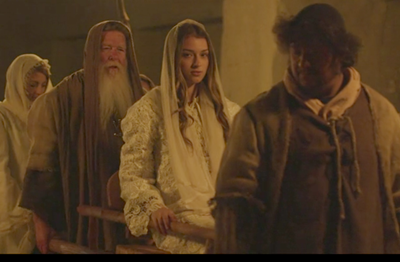
Only those in the bride's family, guests, and others around the town who are prepared could join the procession. Those who were not prepared were left behind. As Jesus warned He will be coming back like a thief in the night.
42 Therefore, stay awake, for you do not know on what day your Lord is coming. 43 But know this, that if the master of the house had known in what part of the night the thief was coming, he would have stayed awake and would not have let his house be broken into. 44 Therefore you also must be ready, for the Son of Man is coming at an hour you do not expect. Matthew 24:42-44 (emphasis added)
But the amazing similarities between the rapture, the wedding feast, and the marriage supper of the Lamb don't end there. When the procession returns to the groom's house for the feast, everyone in the procession enters the house, and then the door is closed for seven days. After the door is closed no one is allowed to enter and neither is anyone allowed to leave until the feast is concluded. If you didn't make it into the feast before the door closed you were left outside. If non-believers (non-prepared people) miss the Rapture they are left behind to endure the Tribulation as referenced in Isaiah 26.
19 Your dead shall live; their bodies shall rise.
You who dwell in the dust, awake and sing for joy!
For your dew is a dew of light,
and the earth will give birth to the dead.
20 Come, my people, enter your chambers,
and shut your doors behind you;
hide yourselves for a little while
until the fury has passed by.
21 For behold, the Lord is coming out from his place
to punish the inhabitants of the earth for their iniquity,
and the earth will disclose the blood shed on it,
and will no more cover its slain. Isaiah 26:19-21
Be Prepared for the Rapture or You Will Miss the Feast
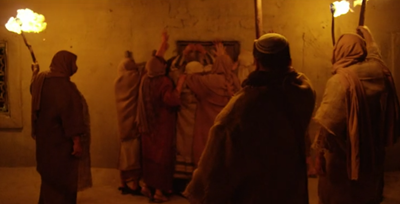 Jesus was very clear in His Matthew 22 parable of the wedding feast that although many are called (invited) to attend, few will be (prepared) chosen.
Jesus was very clear in His Matthew 22 parable of the wedding feast that although many are called (invited) to attend, few will be (prepared) chosen.
And again Jesus spoke to them in parables, saying, 2 "The kingdom of heaven may be compared to a king who gave a wedding feast for his son, 3 and sent his servants to call those who were invited to the wedding feast, but they would not come. 4 Again he sent other servants, saying, ‘Tell those who are invited, “See, I have prepared my dinner, my oxen and my fat calves have been slaughtered, and everything is ready. Come to the wedding feast."’ 5 But they paid no attention and went off, one to his farm, another to his business, 6 while the rest seized his servants, treated them shamefully, and killed them. 7 The king was angry, and he sent his troops and destroyed those murderers and burned their city. 8 Then he said to his servants, ‘The wedding feast is ready, but those invited were not worthy. 9 Go therefore to the main roads and invite to the wedding feast as many as you find.’ 10 And those servants went out into the roads and gathered all whom they found, both bad and good. So the wedding hall was filled with guests.
11 "But when the king came in to look at the guests, he saw there a man who had no wedding garment. 12 And he said to him, ‘Friend, how did you get in here without a wedding garment?’ And he was speechless. 13 Then the king said to the attendants, ‘Bind him hand and foot and cast him into the outer darkness. In that place there will be weeping and gnashing of teeth.’ 14 For many are called, but few are chosen." Matthew 22:1-14 ESV
Why did the man with no wedding garment not get in? He didn't get in because he wasn't prepared. Just because he was at the right place at the right time does not mean he was chosen. The same concept applies to us. Only those who are prepared will be chosen to attend the wedding feast.
That brings up the most important questions:
- Who can be chosen? -- Simple, anyone and everyone CAN be chosen if they decide to accept the free gift.
- How does one become chosen? -- Believe in Jesus Christ and accept him into your heart.
It does not matter what you have done (or not done) in your life. The gift of Grace is free and it is available to absolutely anyone and everyone who will accept it. No one is disqualified from being chosen so long as they accept Jesus as their Lord and Savior and invite him into their heart. The only way that Jesus will reject you is if your final decision in this life is to reject Him. Even if you previously rejected His offer thousands of times, there's still time right now to change your mind but the window is closing soon.
Do not put off your decision until tomorrow, because no one is guaranteed they will have another chance to accept Jesus tomorrow. Should you have questions about why and how to accept the free gift, please click this link to be taken to the Covenant Christian Coalition website to read their short, but thorough description of why drinking from the cup is necessary and how you can do it.
Finally, one thing is for certain. The marriage supper of the Lamp will be the party of parties for all eternity. This is the one party that you absolutely do not want to miss and there's no reason to miss it. If you haven't made your commitment to accept the free offer and drink from the cup of Christ, know that the time is short. Considering the condition of the world right now, it's easy to see that the time of preparation is almost over. Make your choice now or be prepared to endure the fast-approaching time of Tribulation. If you miss the rapture and the feast, it's not too late to accept Jesus into your life, but you will definitely have chosen the hard road and it's most likely your final act will be to become a Tribulation Martyr. However, once your life is over whether before the Rapture or after, your choices are made and the result of rejection will be horrific.
Will you drink from the cup?
